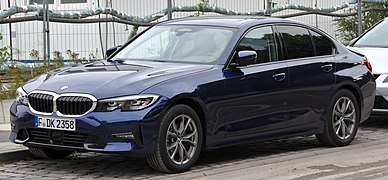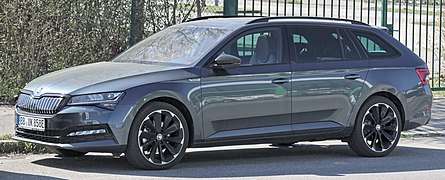D-segment
The D-segment is the third largest of the European segments for passenger cars, and is described as "large cars".[1][2] It is equivalent to the Euro NCAP "large family car" size class,[3] and the present-day definition of the mid-size car category used in North America.[4][5] Compact executive cars are part of the D-segment size category.


Most D-segment cars are saloons or estates but hatchbacks were common. Pricing and specification of D-segment cars can vary greatly, from basic low-cost transport to more luxurious and expensive models.
Sales of D-segment cars represent 8% of the market.
Current models
The five highest selling D-segment cars in Europe are the Volkswagen Passat, Mercedes-Benz C-Class, Audi A4/S4/RS4, BMW 3 Series and Škoda Superb.[6]
 Volkswagen Passat
Volkswagen Passat
(2014–present model shown)_%E2%80%93_Frontansicht%2C_12._Juli_2014%2C_D%C3%BCsseldorf.jpg)


 Škoda Superb
Škoda Superb
(2001–present; 2015–present model shown)
Historic models
Note: this list includes cars from these decades which carried a different nameplate or numeric designation to the modern day equivalent, and in some cases there is no modern day direct equivalent
1960s
- Austin/Morris 1800 (launched 1964)
- Fiat 124 (launched 1966)
- Fiat 125 (launched 1967)
- Ford Cortina (launched 1962)
- Hillman Hunter (launched 1966)
- Peugeot 404 (launched 1960)
- Peugeot 504 (launched 1968)
- Renault 16 (launched 1965)
- Renault 12 (launched 1969)
1970s
- Alfa Romeo Alfetta (launched 1972)
- Audi 80 (launched 1972)
- Fiat 131/Mirafiori (launched 1974)
- Honda Accord (launched 1976)
- Lancia Beta (launched 1972)
- Leyland Princess (launched 1975)
- Opel Ascona (launched 1970)
- Peugeot 305 (launched 1978)
- Renault 18 (launched 1978)
- Toyota Carina (launched 1972)
- Vauxhall Cavalier (launched 1975)
- Volkswagen K70 (launched 1970)
- Volkswagen Passat (launched 1973)
- Volvo 200 Series (launched 1974)
1980s
- Alfa Romeo 75 (launched 1985)
- Austin Montego (launched 1984)
- Citroen BX (launched 1982)
- Fiat Croma (launched 1985)
- Fiat Tempra (launched 1989)
- Ford Sierra (launched 1982)
- Hyundai Stellar (launched 1984)
- Mercedes-Benz 190E (launched 1982)
- Nissan Stanza (launched 1982)
- Opel Vectra/Vauxhall Cavalier (launched 1988)
- Peugeot 405 (launched 1987)
- Renault 21 (launched 1986)
- Volvo 440/460 (launched 1987)
1990s
- Alfa Romeo 155 (launched 1992)
- Alfa Romeo 156 (launched 1997)
- Citroen Xantia (launched 1993)
- Fiat Marea (launched 1996)
- Hyundai Sonata (launched 1989)
- Kia Clarus (launched 1999)
- Lancia Lybra (launched 1999)
- Nissan Primera (launched 1990)
- Opel/Vauxhall Vectra (launched 1995)
- Peugeot 406 (launched 1995)
- Renault Laguna (launched 1993)
- Rover 600 Series (launched 1993)
- Toyota Avensis (launched 1998)
2000s
- Alfa Romeo 159 (launched 2005)
- Citroen C5 (launched 2001)
- Hyundai i40 (launched 2011)
- Peugeot 407 (launched 2004)
- Seat Exeo (launched 2009)
European sales figures
| 2018 rank |
Make | Model | 2014 sales | 2015 sales | 2016 sales | 2017 sales | 2018 sales | % change (2017–2018) |
|---|---|---|---|---|---|---|---|---|
| 1 | Volkswagen | Passat | 153,677 | 226,127 | 206,813 | 183,288 | 154,074 | |
| 2 | Mercedes-Benz | C-Class | 176,038 | 176,915 | 150,995 | |||
| 3 | Audi | A4/S4/RS4 | 162,655 | 146,006 | 112,484 | |||
| 4 | BMW | 3 Series | 144,561 | 129,053 | 106,991 | |||
| 5 | Škoda | Superb | 46,149 | 50,533 | 85,879 | 81,410 | 74,697 | |
| 6 | Opel/Vauxhall | Insignia | 92,694 | 88,544 | 73,161 | 72,347 | 67,424 | |
| 7 | BMW | 4 Series | 67,983 | 64,710 | 52,248 | |||
| 8 | Audi | A5/S5/RS5 | 43,686 | 61,619 | 49,799 | |||
| 9 | Ford | Mondeo | 45,405 | 79,673 | 70,900 | 56,173 | 49,596 | |
| 10 | Volvo | S60/V60 | 53,268 | 45,335 | 46,945 | |||
| 11 | Volkswagen | Arteon | 0 | 9,798 | 21,495 | |||
| 12 | Mazda | Mazda6 | 31,032 | 30,519 | 29,226 | 23,090 | 23,090 | |
| 13 | Renault | Talisman | — | 1,824 | 34,344 | 32,163 | 19,784 | |
| 14 | Toyota | Avensis | 28,972 | 33,197 | 34,998 | 25,319 | 17,277 | |
| 15 | Alfa Romeo | Giulia | 10,475 | 24,679 | 17,075 | |||
| 16 | Kia | Optima | 3,409 | 3,263 | 9,515 | 16,152 | 14,404 | |
| 17 | Peugeot | 508 | 41,797 | 43,301 | 37,104 | 22,842 | 13,378 | |
| 18 | Jaguar | XE | 24,461 | 18,999 | 10,877 | |||
| 19 | Hyundai | i40 | 25,016 | 25,045 | 20,253 | 15,251 | 9,144 | |
| 20 | Subaru | Legacy/Outback | 6,415 | 10,806 | 8,242 | 7,016 | 7,460 | |
| 21 | Lexus | IS | 6,234 | 5,649 | 5,413 | |||
| 22 | Kia | Stinger | 0 | 1,143 | 3,820 | |||
| 23 | Citroën | DS5 | 9,130 | 5,738 | 2,720 | |||
| 24 | Subaru | Levorg | — | 2,437 | 4,689 | 2,865 | 1,748 | |
| 25 | Infiniti | Q50 | 2,698 | 1,777 | 1,471 | |||
| 26 | Lexus | RC | 1,815 | 1,390 | 1,334 | |||
| 27 | Volkswagen | CC | 6,750 | 712 | 424 | |||
| 28 | Infiniti | Q60 | 99 | 507 | 368 | |||
| 29 | Citroën | C5 | 18,064 | 13,480 | 9,464 | 4,939 | 151 | |
| 30 | Honda | Accord | 3,499 | 1,918 | 49 | 16 | 21 | |
| 31 | Chevrolet | Malibu | 334 | 6 | 6 | 1 | 4 | |
| source: [6] | ||||||||
See also
- Car classifications
- Mid-size car
References
- "Regulation (EEC) No 4064/89 - Merger Procedure" (PDF). www.europa.eu.
exact market definition was left open .. boundaries between segments are blurred by factors other than the size or length of cars
- "Impact on the Competitiveness of the European Automotive Industry of Potential FTA with India and ASEAN" (PDF). www.europa.eu. p. 8. Archived from the original (PDF) on 29 April 2013.
- "Latest Safety Ratings". www.euroncap.com. Retrieved 8 January 2019.
- "2019 Nissan Altima Proves Midsize Sedans Aren't Dead Yet". www.wardsauto.com. 8 October 2018. Retrieved 26 January 2019.
- "America's D-Segment Flab". www.thetruthaboutcars.com. 9 October 2008. Retrieved 26 January 2019.
- Bart Demandt (13 February 2019). "European sales 2018 Midsized car segment". carsalesbase.com. Archived from the original on 6 June 2019. Retrieved 12 December 2019.